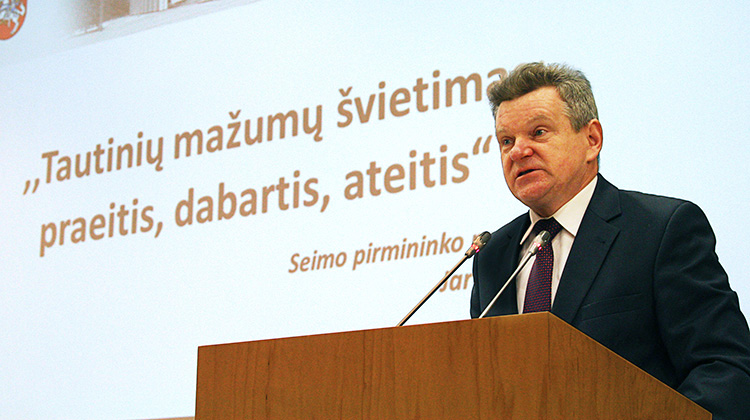- March 16, 2016
- 592
An educational conference in the Seimas

A conference “The national minorities’ education in Lithuania: experience, present, future” was held on Wednesday, 16th of March, in the Seimas.
The aim of the meeting was to discuss development of education within that last decades, problems and achievements of the national minorities’ school system. The meeting was initiated by the Electoral Action of Poles in Lithuania (EAPL) in the Seimas with Jarosław Narkiewicz, the Deputy Chairman and a member of the Electoral Action of Poles in Lithuania.
Jarosław Narkiewicz noted that the national minorities’ school system has deep roots and experience. Today, the biggest part constitutes education in Polish and Russian. As he said, the current number of students in the Polish schools in Lithuania is about 12 000, and in the Russian schools – 14 000. During the post-war period national minorities had to defend their assets against the Soviet authority, which held a negative attitude towards teaching in Polish.
The new amendment to the School Education Act of 2011 reduced the national minorities’ rights. The issue still remains unsolved.
Education in the national minorities languages depended much on the decisions of politicians, but it passed muster: the quality of its education is unequivocally proven and there is no need to break this system. It needs to be improved, developed, we need to be pleased with the fact that the graduates of Polish and Russian schools will acquire solid knowledge, find their feet in the labor market and in the new conditions” – Jarosław Narkiewicz summarized his speech.
Genoveita Krasauskienė, the Deputy Minister of Education and Science, noted that the demographical changes occurring in Lithuania influence the school education at first: the number of students is decreasing and the number of “unnecessary” teachers is increasing.
“This causes the need for optimization of the school network, which also unavoidably affects the national minorities’ schools. The number of general education schools, where the national minorities students learn, is also decreasing, as it is also with schools with the Lithuanian language of instruction.
As the Deputy Minister said, new programs of teaching Lithuanian language were approved this year. “Since the 1st of September 2016, the prepared schools can begin working according to the new programs of teaching Lithuanian language in grades 1-3, and all the schools – in grades 5,7,9. Educational aids will be used to implement the programs, a school book for the 1st grade and references are being prepared”.
In regard to the Władysław Syrokomla High School in Vilnius, which is seeking accreditation, she assured that “there is nothing to stop it and all the positive decisions will be made in the near future”.
Dr Katarzyna Miksza spoke about the national minorities’ rights as the innate human rights, reminding that it is the state that should serve its citizens, not the other way round. “The national minorities’ rights are not a special category of rights, these are not privileges, nor the state’s inner matter. The national minorities’ rights are human rights and their protection in ensured by a number of international documents. Lithuania has accepted these international obligations” – said Dr Katarzyna Miksza.
As she said, one of the most important rights is the right to learn in a national language and to use it in a public space. While speaking about the rights to learn, we tend to forget about children, who deserve special protection and who are not always able to enforce obeying their rights. That is why their rights need to be our prime concern.
The biggest problem in Lithuania is the lack of intentional politics aimed at the implementation of the practical principle of equality.
“It is alarming when official people note in a public space that all citizens are equal before the law and it is the national minorities that demand special rights for themselves in the area of using their national language. This is not a unique right. “Equality”, according to the politicians, means that all citizens talk in the same language, they all learn in one language. The lack of discrimination is not about treating everyone the same, the equality principle means that different people diverse in their language, race, or gender have the same right to express and preserve their identity” – said dr Katarzyna Miksza.
Renata Cytacka, the leader of the Forum of Parents from the Polish schools in the Šalčininkai region, spoke on the behalf of parents. She called the issues of publishing school books and other problems artificial, aimed at total Lithuanization of the national minorities’ school education. Józef Kwiatkowski, the head of the Association of Teachers of Polish schools in Lithuania “Macierz Szkolna”, Romantas Vaitkus, the Vice Chancellor of the Government, and Audronė Pitrėnienė, the Minister of Education and Science, also took the floor.
Fot. Marian Paluszkiewicz
Translated by Diana Dymel within the framework of a traineeship programme of the European Foundation of Human Rights, www.efhr.eu.

